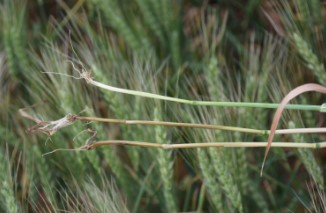By Emmanuel Byamukama
Figure 1. A white wheat head due to wheat stem maggot injury (picture on the left). Such heads when they are pulled on, they dislodge easily from the plant (picture on the right).
A few wheat fields scouted last week were found with white (bleached heads). Several factors can lead to white heads in a wheat field. The most common cause of white heads is wheat stem maggot feeding (Figure 1). The larvae of the stem maggot feeds within the stem near the flag leaf cutting off water and nutrient supply to the head. To determine if the white head is due to stem maggot larvae feeding, pull gently on the symptomatic wheat head and it will easily come out of the plant stem. Details on stem maggot adult identification can found in Wheat Stem Maggot Adults Observed in South Dakota Wheat.
Root and crown rots can also cause wheat heads to become white. Fungal pathogens including Fusarium spp (cause Fusarium foot and crown rot), Bipolaris sorokiniana (causes common root rot) and Gaumanomyces graminis var. tritici (causes take-all) cause root or crown rots leading to poor water and nutrients uptake. White heads caused by root or crown rots can be identified by uprooting the symptomatic plants and observing discoloration of the subcrown internode and/or lower nodes on the plant. (Figure 2). In addition, plants will often have root rot and reduced root growth. The pathogens that cause root and crown rots survive on residue and in soil. They can infect plants early in the season. However, symptoms are often not present until the wheat begins to head and white heads appear. Symptoms are often exacerbated by moisture and heat stress. Root and crown rots can be managed through a combination of crop rotation, planting tolerant cultivars, planting in a well-drained soil, and use of fungicide seed treatments.

Figure 2. Wheat tillers showing discoloration of the lower nodes due to root and crown rot. These are contrasted with a healthy tiller (top plant).
Click here to see more...